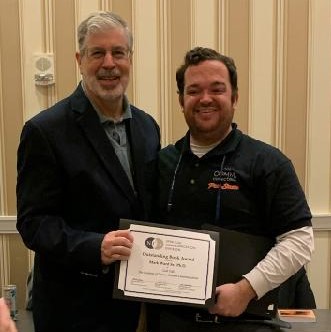UHV professor wins award for book on ‘God Problem’

Mark Ward Sr., a University of Houston-Victoria professor of communication, has been recognized for his book, “God Talk: The Problem of Divine-Human Communication,” which was named the Outstanding Edited Volume of 2023 by the Spiritual Communication Division of the National Communication Association.
“A growing number of scholars are researching communication in religious contexts,” Ward said. “In doing so, they are studying groups who claim that God communicates with them. For communication scholars, the ‘God Problem’ is how to treat that claim.”
The National Communication Association is an organization that advances communication studies in multiple forms, modes and media and examines how communication is studied. The association offers awards in a variety of divisions relating to different segments and topics of communication. Ward received his award at the association’s annual convention on Nov. 17 in Washington, D.C.
“Mark Ward is an accomplished researcher, and his work on communication in faith settings is widely recognized,” said Kyoko Amano, dean of the UHV College of Liberal Arts & Social Sciences. “This award is well deserved. We are proud to have Mark as a member of our faculty.”
In his book, Ward says researchers must decide whether to dismiss claims of divine-human communication because they cannot be directly observed or are unknowable, go along with the claims as if they are true to better understand what religious groups experience, or affirm the claims as true.
“Each option has its advantages and disadvantages,” Ward said. “My book pulls together 10 chapters from various scholars who study religious communication. They each set forth different approaches for research methods that take the God Problem into account while producing scholarship that meets academic standards in communication studies.”
At the same time, Ward said, scholars tend to research subjects with which they have a personal connection. Many who study religious communication are people of faith and believe in a higher supernatural power. For that reason, they must balance a group’s claims of divine-human communication with their own beliefs.
“If you yourself believe in a higher power that communicates with humans, and if you research a religious community which also holds that belief, how do you avoid confirmation bias?” Ward said. “No one can be completely objective. You must reflect on your biases. How do they influence what you observe and how you interpret your observations? Then you must state that upfront and take it into account when you publish your research.”
Ten years ago, Ward first published a critique of the God Problem. Then, in 2019 and 2020, he organized discussion panels for the annual conventions of the National Communication Association. Out of that, he recruited scholars to contribute chapters for “God Talk.”
As editor of the volume, Ward then undertook the multiyear process of guiding chapter contributors and shepherding the manuscript through book proposals, peer reviews and finding a publisher. “God Talk” was released earlier this year by Peter Lang Publishers.
Contributors to “God Talk” use ethnography as their research method, Ward said. They interact with members of a religious community, observing how they speak to one another and conducting interviews. Then they interpret how key words and phrases used by group members convey assumptions that the group takes for granted in its shared culture.
Ward appreciated the views of other scholars in his book. “My goal was to start a conversation,” he said. “Other researchers can have different views than mine. But we all need to work out solutions to the God Problem and then defend why our different solutions can produce credible research and scholarship.”
“God Talk” has been praised by eminent scholars. Clifford G. Christians, Research Professor of Communications Emeritus at the University of Illinois, wrote, “The intelligence of this exceptional book is a perfect 10. The theoretical depth of every chapter reflects research brilliance.”
Tina M. Harris, holder of Louisiana State University’s Endowed Chair of Race, Media, and Cultural Literacy, wrote that “as a religious communication scholar who also identifies as a theist-scholar, I found every chapter empowering as they encourage the field to reconsider ... ‘the immeasurable.’ This book is a must!”
The book can be purchased online through Amazon or the publisher’s website.
The University of Houston-Victoria, located in the heart of the Coastal Bend region since 1973 in Victoria, Texas, offers courses leading to more than 50 academic programs in the schools of Arts & Sciences; Business Administration; and Education, Health Professions & Human Development. UHV provides face-to-face classes at its Victoria campus, as well as an instructional site in Katy, Texas, and online classes that students can take from anywhere. UHV supports the American Association of State Colleges and Universities Opportunities for All initiative to increase awareness about state colleges and universities and the important role they have in providing a high-quality and accessible education to an increasingly diverse student population, as well as contributing to regional and state economic development.

